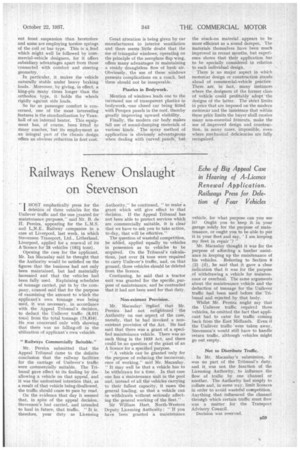Railways Renew Onslaught on Stevenson
Page 81

If you've noticed an error in this article please click here to report it so we can fix it.
Echo of Big Appeal Case in Hearing of A-Licence Renewal Application. Railways Press for Deletion of Four Vehicles
" I MOST emphatically press for the
I deletion of three vehicles for the Unilever traffic and the one granted for maintenance purposes," said Mr. B. de a Pereira, appearing for the L.M.S. and L..N.E. Railway companies in a case at Liverpool, last week, in which Stevenson Transport, Ltd., Litherland, Liverpool, applied for a renewal of its Alicence for 28 vehicles (194 tons).
Opening the case for the applicant, Mr. Ian Macaula.y said he thought that the Authority would be satisfied on the figures that the business had not only been maintained, but had materially increased and that the vehicles had been fully used. Explaining schedules of tonnage carried, put in by the company, counsel said that for the purpose of examining the amount to which the applicant's own tonnage was being
• used, it was necessary, in accordance with the Appeal Tribunal's decision, to deduct the Unilever traffic (8,021. tons) from the total tonnage (73,816). He was concerned only with showing that there was no falling-off in the utilization of applicant's own vehicles.
" Railways Commercially Suitable."
Mr. Pereira submitted that the Appeal Tribunal came to the definite conclusion that the railway facilities for the carriage of Unilever's ixaffic were commercially suitable. The Tribunal gave effect to its finding by disallowing a vehicle on that appeal, and it was the undoubted intention that, as a result of that vehicle being disallowed, the traffic should cease to pass by road.
On the evidence that day it seemed that, in spite of the appeal decision, Stevenson's had carried, and intended to haul in future, that traffic. " It is, therefore, your duty as Licensing Authority," he continued, " to make a grant which will give effect to that decision. If the Appeal Tribunal has not been able to protect services which are commercially suitable, it is cleat that we have to ask you to take action, to-day, that will be effective."
The question of wasteful competition, he added, applied equally to vehicles in possession as to vehicles to be acquired. On the Tribunal's calculations, just over 24 tons were required to carry Unilever's traffic, and, on that ground, three vehicles should be deleted from the licence.
Continuing, he said that a tractor unit was granted for the specific, putpose of maintenance, and he contended that it had not been used for that duty.
Non-existent Provision.
Mr. Macaulay replied that Mr. Pereira had not enlightened the Authority on one aspect of the case, namely, that he had invoked a nonexistent provision of the Act. He had said that there was a grant of a specified maintenance vehicle. There was no such thing in the 1933 Act, and there could be no question of the grant of an A licence for a specified purpose. " A vehicle can be granted only for the purpose of reducing. the inconvenience of working," said Mr. Macaulay. " It may well be that a vehicle has to be withdrawn for a time. In that case one has a maintenance unit in the pool and, instead of all the vehicles carrying to their fullest capacity, it eases the general loading, so that a vehicle can be withdrav;n without seriously affecting the general working of the fleet."
Sir William Hart, North-Western Deputy Licensing Authority : "If you have been granted a maintehance vehicle, for what purpose can you use it? Ought you to keep it in your garage solely for the purpose of maintenance, or ought you to be able to put it in your fleet and say, 'I am keeping my fleet in repair '1"
Mr. Macaulay thought it was for the purpose of affording a haulier assistance in keeping up the maintenance of his vehicles. Referring to Section 6 (2) (4), he said that it gave a clear indication that it was for the purpose of withdrawing a vehicle for Maintenance or overhaul. The same arguments about the maintenance vehicle and the deduction of tonnage for the Unilever traffic had been used before the Tribunal and rejected by that body.
Whilst Mr. Pereira might say that the Unilever traffic required three vehicles, he omitted the fact that applicant had to cater for traffic coming back from the East Midlands. Even if the Unilever traffic 'were taken away, Stevenson's would still have to handle return traffic, although vehicles might go out empty.
Not to Distribute Traffic.
In Mr. Macaulay's submission, it was no part of the Tribunal's duty, and it was not the function of the Licensing Authority, to influence the flow of traffic by one Channel or another. The Authority had simply to collate and, in some way, limit licences in order to avoid wasteful competition. Anything that influenced the channel throfigh which certain traffic must flow was a matter for the Transport Advisory Council.
Decision was reserved.
























































































































